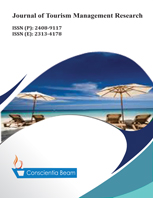A Conceptual Framework of Customized Services for Tourism Industry: Perspective of Emotion and Moderator of Gender
DOI:
https://doi.org/10.18488/journal.31.2021.81.23.29Abstract
Customized services allow travelers to receive services that would meet their unique needs. This study establishes a theoretical framework of customized service for the tourism industry including the emotional and behavioral outcomes of customized service, integrating the moderator of gender. In tourism, the interactions between the traveler and the service provider can generate the feeling of gratitude. However, there is a gap in the literature developing a framework integrating customized service and gratitude in tourism contexts. In addition, there is a lack of research investigating the effect of gender on the differences between 'males' and 'females' emotional responses after receiving customized services. This study attempts to bridge this gap in the literature by constructing a theoretical framework of the relationship among customized service, customer gratitude, customer repurchase intentions, and gender. The framework proposed would provide explanations of the effect of the social interactions between travelers and the service provider in the tourism industry. Furthermore, the study would help explain the impact of customized services on 'customers' repurchase intentions from the perspective of emotions and how men and women differ in their emotional responses after receiving customized services. The framework proposed would assist the tourism industry to take advantage of customized services to retain customers in the company and make those customers loyal to the company.

